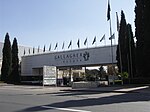Madhya Kailash Temple, Midrand

The Madhya Kailash Temple (Tamil: மத்திய கைலாசம்) is a Hindu temple in Midrand, South Africa. The temple is dedicated to Lord Shiva who is the formless, timeless and spaceless Supreme God in Shaivism, one of the major branches of Hinduism. The resident priest of the temple is Guru Nadarajah Sarma. It was built recently due to the prominent increasing of the Hindu community in the area. The temple serves many devotees in the province of Gauteng and all South Africans. The temple has been a true example of Auvayar's saying 'Thirai Kadal Odiyum, thiravyam thedu' and is serving hundred of thousands of devotees who follow our rituals and our ceremonies. The temple has been a complete powerhouse uniting all devotees under one roof. There are many prayers and cultural events that take place on a regular basis which is open to all public to take part in and get the blessings of the almighty. Guru Nadarajah has been a pioneer and has served South Africa for over 25 years. Coming from the most Orthodox and religious family, Guru Nadarajah provides religious guidance and performs all the prayers as per the Agama Sastras. The temple observes numerous religious functions throughout the year and hosts a number of cultural activities such as Bharatanatyam and percussion classes on a weekly basis.
Excerpt from the Wikipedia article Madhya Kailash Temple, Midrand (License: CC BY-SA 3.0, Authors, Images).Madhya Kailash Temple, Midrand
Ridge Road,
Geographical coordinates (GPS) Address Nearby Places Show on map
Geographical coordinates (GPS)
| Latitude | Longitude |
|---|---|
| N -26.016833333333 ° | E 28.1325 ° |
Address
Ridge Road
Ridge Road
1682 , Johannesburg Ward 110
Gauteng, South Africa
Open on Google Maps





